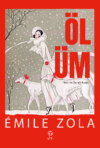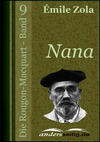Kitabı oku: «The Three Cities Trilogy: Rome, Volume 4», sayfa 7
Pierre, who was compassionately inclined towards all creation, looked at the hen with the emotion which he always felt at the sudden severance of life. However, he at once accepted Prada's story. "Ah! those fowls!" said he. "They treat one another with an idiotic ferocity which even men can scarcely equal. I kept fowls at home at one time, and one of the hens no sooner hurt her leg than all the others, on seeing the blood oozing, would flock round and peck at the limb till they stripped it to the bone."
Prada, however, did not listen, but at once went off; and it so happened that the woman was, on her side, looking for him in order to hand him four eggs which, after a deal of searching, she had discovered in odd corners about the house. The Count made haste to pay for them, and called to Pierre, who was lingering behind: "We must look sharp! We sha'n't reach Rome now until it is quite dark."
They found Santobono quietly waiting in the carriage, where he had again installed himself on the bracket with his spine resting against the box-seat and his long legs drawn back under him, and he again had the little basket of figs on his knees, and clasped it with his big knotty hands as though it were something fragile and rare which the slightest jolting might damage. His cassock showed like a huge blot, and in his coarse ashen face, that of a peasant yet near to the wild soil and but slightly polished by a few years of theological studies, his eyes alone seemed to live, glowing with the dark flame of a devouring passion. On seeing him seated there in such composure Prada could not restrain a slight shudder. Then, as soon as the victoria was again rolling along the road, he exclaimed: "Well, Abbe, that glass of wine will guarantee us against the malaria. The Pope would soon be cured if he could imitate our example."
Santobono's only reply was a growl. He was in no mood for conversation, but wrapped himself in perfect silence, as in the night which was slowly falling. And Prada in his turn ceased to speak, and, with his eyes still fixed upon the other, reflected on the course that he should follow.
The road turned, and then the carriage rolled on and on over another interminable straight highway with white paving, whose brilliancy made the road look like a ribbon of snow stretching across the Campagna, where delicate shadows were slowly falling. Gloom gathered in the hollows of the broad undulations whence a tide of violet hue seemed to spread over the short herbage until all mingled and the expanse became an indistinct swell of neutral hue from one to the other horizon. And the solitude was now yet more complete; a last indolent cart had gone by and a last tinkling of horses' bells had subsided in the distance. There was no longer a passer-by, no longer a beast of the fields to be seen, colour and sound died away, all forms of life sank into slumber, into the serene stillness of nihility. Some fragments of an aqueduct were still to be seen at intervals on the right hand, where they looked like portions of gigantic millepeds severed by the scythe of time; next, on the left, came another tower, whose dark and ruined pile barred the sky as with a huge black stake; and then the remains of another aqueduct spanned the road, assuming yet greater dimensions against the sunset glow. Ah! that unique hour, the hour of twilight in the Campagna, when all is blotted out and simplified, the hour of bare immensity, of the infinite in its simplest expression! There is nothing, nothing all around you, but the flat line of the horizon with the one splotch of an isolated tower, and yet that nothing is instinct with sovereign majesty.
However, on the left, towards the sea, the sun was setting, descending in the limpid sky like a globe of fire of blinding redness. It slowly plunged beneath the horizon, and the only sign of cloud was some fiery vapour, as if indeed the distant sea had seethed at contact with that royal and flaming visit. And directly the sun had disappeared the heavens above it purpled and became a lake of blood, whilst the Campagna turned to grey. At the far end of the fading plain there remained only that purple lake whose brasier slowly died out behind the black arches of the aqueduct, while in the opposite direction the scattered arches remained bright and rosy against a pewter-like sky. Then the fiery vapour was dissipated, and the sunset ended by fading away. One by one the stars came out in the pacified vault, now of an ashen blue, while the lights of Rome, still far away on the verge of the horizon, scintillated like the lamps of light-houses.
And Prada, amidst the dreamy silence of his companions and the infinite melancholy of the evening and the inexpressible distress which even he experienced, continued to ask himself what course he should adopt. Again and again he mentally repeated that he could not allow people to be poisoned. The figs were certainly intended for Cardinal Boccanera, and on the whole it mattered little to him whether there were a cardinal the more or the fewer in the world. Moreover, it had always seemed to him best to let Destiny follow its course; and, infidel that he was, he saw no harm in one priest devouring another. Again, it might be dangerous for him to intervene in that abominable affair, to mix himself up in the base, fathomless intrigues of the black world. But on the other hand the Cardinal was not the only person who lived in the Boccanera mansion, and might not the figs go to others, might they not be eaten by people to whom no harm was intended? This idea of a treacherous chance haunted him, and in spite of every effort the figures of Benedetta and Dario rose up before him, returned and imposed themselves on him though he again and again sought to banish them from his mind. What if Benedetta, what if Dario should partake of that fruit? For Benedetta he felt no fear, for he knew that she and her aunt ate their meals by themselves, and that their cuisine and the Cardinal's had nothing in common. But Dario sat at his uncle's table every day, and for a moment Prada, pictured the young Prince suddenly seized with a spasm, then falling, like poor Monsignor Gallo, into the Cardinal's arms with livid face and receding eyes, and dying within two hours.
But no, no! That would be frightful, he could not suffer such an abomination. And thereupon he made up his mind. He would wait till the night had completely gathered round and would then simply take the basket from Santobono's lap and fling it into some dark hollow without saying a word. The priest would understand him. The other one, the young Frenchman, would perhaps not even notice the incident. Besides, that mattered little, for he would not even attempt to explain his action. And he felt quite calm again when the idea occurred to him to throw the basket away while the carriage passed through the Porta Furba, a couple of miles or so before reaching Rome. That would suit him exactly; in the darkness of the gateway nothing whatever would be seen.
"We stopped too long at that /osteria/," he suddenly exclaimed aloud, turning towards Pierre. "We sha'n't reach Rome much before six o'clock. Still you will have time to dress and join your friend." And then without awaiting the young man's reply he said to Santobono: "Your figs will arrive very late, Abbe."
"Oh!" answered the priest, "his Eminence receives until eight o'clock. And, besides, the figs are not for this evening. People don't eat figs in the evening. They will be for to-morrow morning." And thereupon he again relapsed into silence.
"For to-morrow morning – yes, yes, no doubt," repeated Prada. "And the Cardinal will be able to thoroughly regale himself if nobody helps him to eat the fruit."
Thereupon Pierre, without pausing to reflect, exclaimed: "He will no doubt eat it by himself, for his nephew, Prince Dario, must have started to-day for Naples on a little convalescence trip to rid himself of the effects of the accident which laid him up during the last month." Then, having got so far, the young priest remembered to whom he was speaking, and abruptly stopped short.
The Count noticed his embarrassment. "Oh! speak on, my dear Monsieur Froment," said he, "you don't offend me. It's an old affair now. So that young man has left, you say?"
"Yes, unless he has postponed his departure. However, I don't expect to find him at the palazzo when I get there."
For a moment the only sound was that of the continuous rumble of the wheels. Prada again felt worried, a prey to the discomfort of uncertainty. Why should he mix himself up in the affair if Dario were really absent? All the ideas which came to him tired his brain, and he ended by thinking aloud: "If he has gone away it must be for propriety's sake, so as to avoid attending the Buongiovanni reception, for the Congregation of the Council met this morning to give its decision in the suit which the Countess has brought against me. Yes, I shall know by and by whether our marriage is to be dissolved."
It was in a somewhat hoarse voice that he spoke these words, and one could realise that the old wound was again bleeding within him. Although Lisbeth had borne him a son, the charge levelled against him in his wife's petition for divorce still filled him with blind fury each time that he thought of it. And all at once he shuddered violently, as if an icy blast had darted through his frame. Then, turning the conversation, he added: "It's not at all warm this evening. This is the dangerous hour of the Roman climate, the twilight hour when it's easy to catch a terrible fever if one isn't prudent. Here, pull the rug over your legs, wrap it round you as carefully as you can."
Then, as they drew near the Porta Furba, silence again fell, more profound, like the slumber which was invincibly spreading over the Campagna, now steeped in night. And at last, in the bright starlight, appeared the gate, an arch of the Acqua Felice, under which the road passed. From a distance, this fragment seemed to bar the way with its mass of ancient half-fallen walls. But afterwards the gigantic arch where all was black opened like a gaping porch. And the carriage passed under it in darkness whilst the wheels rumbled with increased sonority.
When the victoria emerged on the other side, Santobono still had the little basket of figs upon his knees and Prada looked at it, quite overcome, asking himself what sudden paralysis of the hands had prevented him from seizing it and throwing it into the darkness. Such had still been his intention but a few seconds before they passed under the arch. He had even given the basket a final glance in order that he might the better realise what movements he should make. What had taken place within him then? At present he was yielding to increasing irresolution, henceforth incapable of decisive action, feeling a need of delay in order that he might, before everything else, fully satisfy himself as to what was likely to happen. And as Dario had doubtless gone away and the figs would certainly not be eaten until the following morning, what reason was there for him to hurry? He would know that evening if the Congregation of the Council had annulled his marriage, he would know how far the so-called "Justice of God" was venal and mendacious! Certainly he would suffer nobody to be poisoned, not even Cardinal Boccanera, though the latter's life was of little account to him personally. But had not that little basket, ever since leaving Frascati, been like Destiny on the march? And was it not enjoyment, the enjoyment of omnipotence, to be able to say to himself that he was the master who could stay that basket's course, or allow it to go onward and accomplish its deadly purpose? Moreover, he yielded to the dimmest of mental struggles, ceasing to reason, unable to raise his hand, and yet convinced that he would drop a warning note into the letter-box at the palazzo before he went to bed, though at the same time he felt happy in the thought that if his interest directed otherwise he would not do so.
And the remainder of the journey was accomplished in silent weariness, amidst the shiver of evening which seemed to have chilled all three men. In vain did the Count endeavour to escape from the battle of his thoughts, by reverting to the Buongiovanni reception, and giving particulars of the splendours which would be witnessed at it: his words fell sparsely in an embarrassed and absent-minded way. Then he sought to inspirit Pierre by speaking to him of Cardinal Sanguinetti's amiable manner and fair words, but although the young priest was returning home well pleased with his journey, in the idea that with a little help he might yet triumph, he scarcely answered the Count, so wrapt he was in his reverie. And Santobono, on his side, neither spoke nor moved. Black like the night itself, he seemed to have vanished. However, the lights of Rome were increasing in number, and houses again appeared on either hand, at first at long intervals, and then in close succession. They were suburban houses, and there were yet more fields of reeds, quickset hedges, olive-trees overtopping long walls, and big gateways with vase-surmounted pillars; but at last came the city with its rows of small grey houses, its petty shops and its dingy taverns, whence at times came shouts and rumours of battle.
Prada insisted on setting his companions down in the Via Giulia, at fifty paces from the palazzo. "It doesn't inconvenience me at all," said he to Pierre. "Besides, with the little time you have before you, it would never do for you to go on foot."
The Via Giulia was already steeped in slumber, and wore a melancholy aspect of abandonment in the dreary light of the gas lamps standing on either hand. And as soon as Santobono had alighted from the carriage, he took himself off without waiting for Pierre, who, moreover, always went in by the little door in the side lane.
"Good-bye, Abbe," exclaimed Prada.
"Good-bye, Count, a thousand thanks," was Santobono's response.
Then the two others stood watching him as he went towards the Boccanera mansion, whose old, monumental entrance, full of gloom, was still wide open. For a moment they saw his tall, rugged figure erect against that gloom. Then in he plunged, he and his little basket, bearing Destiny.
XII
IT was ten o'clock when Pierre and Narcisse, after dining at the Caffe di Roma, where they had long lingered chatting, at last walked down the Corso towards the Palazzo Buongiovanni. They had the greatest difficulty to reach its entrance, for carriages were coming up in serried files, and the inquisitive crowd of on-lookers, who pressed even into the roadway, in spite of the injunctions of the police, was growing so compact that even the horses could no longer approach. The ten lofty windows on the first floor of the long monumental facade shone with an intense white radiance, the radiance of electric lamps, which illumined the street like sunshine, spreading over the equipages aground in that human sea, whose billows of eager, excited faces rolled to and fro amidst an extraordinary tumult.
And in all this there was not merely the usual curiosity to see uniforms go by and ladies in rich attire alight from their carriages, for Pierre soon gathered from what he heard that the crowd had come to witness the arrival of the King and Queen, who had promised to appear at the ball given by Prince Buongiovanni, in celebration of the betrothal of his daughter Celia to Lieutenant Attilio Sacco, the son of one of his Majesty's ministers. Moreover, people were enraptured with this marriage, the happy ending of a love story which had impassioned the whole city: to begin with, love at first sight, with the suddenness of a lightning-flash, and then stubborn fidelity triumphing over all obstacles, amidst romantic circumstances whose story sped from lip to lip, moistening every eye and stirring every heart.
It was this story that Narcisse had related at dessert to Pierre, who already knew some portion of it. People asserted that if the Prince had ended by yielding after a final terrible scene, it was only from fear of seeing Celia elope from the palace with her lover. She did not threaten to do so, but, amidst her virginal calmness, there was so much contempt for everything foreign to her love, that her father felt her to be capable of acting with the greatest folly in all ingenuousness. Only indifference was manifested by the Prince's wife, a phlegmatic and still beautiful Englishwoman, who considered that she had done quite enough for the household by bringing her husband a dowry of five millions, and bearing him five children. The Prince, anxious and weak despite his violence, in which one found a trace of the old Roman blood, already spoilt by mixture with that of a foreign race, was nowadays ever influenced in his actions by the fear that his house and fortune – which hitherto had remained intact amidst the accumulated ruins of the /patriziato/ – might suddenly collapse. And in finally yielding to Celia, he must have been guided by the idea of rallying to the new /regime/ through his daughter, so as to have one foot firmly set at the Quirinal, without withdrawing the other from the Vatican. It was galling, no doubt; his pride must have bled at the idea of allying his name with that of such low folks as the Saccos. But then Sacco was a minister, and had sped so quickly from success to success that it seemed likely he would rise yet higher, and, after the portfolio of Agriculture, secure that of Finances, which he had long coveted. And an alliance with Sacco meant the certain favour of the King, an assured retreat in that direction should the papacy some day collapse. Then, too, the Prince had made inquiries respecting the son, and was somewhat disarmed by the good looks, bravery, and rectitude of young Attilio, who represented the future, and possibly the glorious Italy of to-morrow. He was a soldier, and could be helped forward to the highest rank. And people spitefully added that the last reason which had influenced the Prince, who was very avaricious, and greatly worried by the thought that his fortune must be divided among his five children,8 was that an opportunity presented itself for him to bestow a ridiculously small dowry on Celia. However, having consented to the marriage, he resolved to give a splendid /fete/, such as was now seldom witnessed in Rome, throwing his doors open to all the rival sections of society, inviting the sovereigns, and setting the palazzo ablaze as in the grand days of old. In doing this he would necessarily have to expend some of the money to which he clung, but a boastful spirit incited him to show the world that he at any rate had not been vanquished by the financial crisis, and that the Buongiovannis had nothing to hide and nothing to blush for. To tell the truth, some people asserted that this bravado had not originated with himself, but had been instilled into him without his knowledge by the quiet and innocent Celia, who wished to exhibit her happiness to all applauding Rome.
"Dear me!" said Narcisse, whom the throng prevented from advancing. "We shall never get in. Why, they seem to have invited the whole city." And then, as Pierre seemed surprised to see a prelate drive up in his carriage, the /attache/ added: "Oh! you will elbow more than one of them upstairs. The cardinals won't like to come on account of the presence of the King and Queen, but the prelates are sure to be here. This, you know, is a neutral drawing-room where the black and the white worlds can fraternise. And then too, there are so few /fetes/ that people rush on them."
He went on to explain that there were two grand balls at Court every winter, but that it was only under exceptional circumstances that the /patriziato/ gave similar /galas/. Two or three of the black /salons/ were opened once in a way towards the close of the Carnival, but little dances among intimates replaced the pompous entertainments of former times. Some princesses moreover merely had their day. And as for the few white /salons/ that existed, these likewise retained the same character of intimacy, more or less mixed, for no lady had yet become the undisputed queen of the new society.
"Well, here we are at last," resumed Narcisse as they eventually climbed the stairs.
"Let us keep together," Pierre somewhat anxiously replied. "My only acquaintance is with the /fiancee/, and I want you to introduce me."
However, a considerable effort was needed even to climb the monumental staircase, so great was the crush of arriving guests. Never, in the old days of wax candles and oil lamps, had this staircase offered such a blaze of light. Electric lamps, burning in clusters in superb bronze candelabra on the landings, steeped everything in a white radiance. The cold stucco of the walls was hidden by a series of lofty tapestries depicting the story of Cupid and Psyche, marvels which had remained in the family since the days of the Renascence. And a thick carpet covered the worn marble steps, whilst clumps of evergreens and tall spreading palms decorated every corner. An affluence of new blood warmed the antique mansion that evening; there was a resurrection of life, so to say, as the women surged up the staircase, smiling and perfumed, bare-shouldered, and sparkling with diamonds.
At the entrance of the first reception-room Pierre at once perceived Prince and Princess Buongiovanni, standing side by side and receiving their guests. The Prince, a tall, slim man with fair complexion and hair turning grey, had the pale northern eyes of his American mother in an energetic face such as became a former captain of the popes. The Princess, with small, delicate, and rounded features, looked barely thirty, though she had really passed her fortieth year. And still pretty, displaying a smiling serenity which nothing could disconcert, she purely and simply basked in self-adoration. Her gown was of pink satin, and a marvellous parure of large rubies set flamelets about her dainty neck and in her fine, fair hair. Of her five children, her son, the eldest, was travelling, and three of the girls, mere children, were still at school, so that only Celia was present, Celia in a modest gown of white muslin, fair like her mother, quite bewitching with her large innocent eyes and her candid lips, and retaining to the very end of her love story the semblance of a closed lily of impenetrable, virginal mysteriousness. The Saccos had but just arrived, and Attilio, in his simple lieutenant's uniform, had remained near his betrothed, so naively and openly delighted with his great happiness that his handsome face, with its caressing mouth and brave eyes, was quite resplendent with youth and strength. Standing there, near one another, in the triumph of their passion they appeared like life's very joy and health, like the personification of hope in the morrow's promises; and the entering guests who saw them could not refrain from smiling and feeling moved, momentarily forgetting their loquacious and malicious curiosity to give their hearts to those chosen ones of love who looked so handsome and so enraptured.
Narcisse stepped forward in order to present Pierre, but Celia anticipated him. Going to meet the young priest she led him to her father and mother, saying: "Monsieur l'Abbe Pierre Froment, a friend of my dear Benedetta." Ceremonious salutations followed. Then the young girl, whose graciousness greatly touched Pierre, said to him: "Benedetta is coming with her aunt and Dario. She must be very happy this evening! And you will also see how beautiful she will be."
Pierre and Narcisse next began to congratulate her, but they could not remain there, the throng was ever jostling them; and the Prince and Princess, quite lost in the crush, had barely time to answer the many salutations with amiable, continuous nods. And Celia, after conducting the two friends to Attilio, was obliged to return to her parents so as to take her place beside them as the little queen of the /fete/.
Narcisse was already slightly acquainted with Attilio, and so fresh congratulations ensued. Then the two friends manoeuvred to find a spot where they might momentarily tarry and contemplate the spectacle which this first /salon/ presented. It was a vast hall, hung with green velvet broidered with golden flowers, and contained a very remarkable collection of weapons and armour, breast-plates, battle-axes, and swords, almost all of which had belonged to the Buongiovannis of the fifteenth and sixteenth centuries. And amidst those stern implements of war there was a lovely sedan-chair of the last century, gilded and decorated with delicate paintings. It was in this chair that the Prince's great-grandmother, the celebrated Bettina, whose beauty was historical, had usually been carried to mass. On the walls, moreover, there were numerous historical paintings: battles, peace congresses, and royal receptions in which the Buongiovannis had taken part, without counting the many family portraits, tall and proud figures of sea-captains, commanders in the field, great dignitaries of the Church, prelates and cardinals, amongst whom, in the place of honour, appeared the family pope, the white-robed Buongiovanni whose accession to the pontifical throne had enriched a long line of descendants. And it was among those armours, near that coquettish sedan, and below those antique portraits, that the Saccos, husband and wife, had in their turn just halted, at a few steps from the master and mistress of the house, in order to secure their share of congratulations and bows.
"Look over there!" Narcisse whispered to Pierre, "those are the Saccos in front of us, that dark little fellow and the lady in mauve silk."
Pierre promptly recognised the bright face and pleasant smile of Stefana, whom he had already met at old Orlando's. But he was more interested in her husband, a dark dry man, with big eyes, sallow complexion, prominent chin, and vulturine nose. Like some gay Neapolitan "Pulcinello," he was dancing, shouting, and displaying such infectious good humour that it spread to all around him. He possessed a wonderful gift of speech, with a voice that was unrivalled as an instrument of fascination and conquest; and on seeing how easily he ingratiated himself with the people in that drawing-room, one could understand his lightning-like successes in the political world. He had manoeuvered with rare skill in the matter of his son's marriage, affecting such exaggerated delicacy of feeling as to set himself against the lovers, and declare that he would never consent to their union, as he had no desire to be accused of stealing a dowry and a title. As a matter of fact, he had only yielded after the Buongiovannis had given their consent, and even then he had desired to take the opinion of old Orlando, whose lofty integrity was proverbial. However, he knew right well that he would secure the old hero's approval in this particular affair, for Orlando made no secret of his opinion that the Buongiovannis ought to be glad to admit his grand-nephew into their family, as that handsome young fellow, with brave and healthy heart, would help to regenerate their impoverished blood. And throughout the whole affair, Sacco had shrewdly availed himself of Orlando's famous name, for ever talking of the relationship between them, and displaying filial veneration for this glorious founder of the country, as if indeed he had no suspicion that the latter despised and execrated him and mourned his accession to power in the conviction that he would lead Italy to shame and ruin.
"Ah!" resumed Narcisse addressing Pierre, "he's one of those supple, practical men who care nothing for a smack in the face. It seems that unscrupulous individuals like himself become necessary when states get into trouble and have to pass through political, financial, and moral crises. It is said that Sacco with his imperturbable assurance and ingenious and resourceful mind has quite won the King's favour. Just look at him! Why, with that crowd of courtiers round him, one might think him the master of this palace!"
And indeed the guests, after passing the Prince and Princess with a bow, at once congregated around Sacco, for he represented power, emoluments, pensions, and crosses; and if folks still smiled at seeing his dark, turbulent, and scraggy figure amidst that framework of family portraits which proclaimed the mighty ancestry of the Buongiovannis, they none the less worshipped him as the personification of the new power, the democratic force which was confusedly rising even from the old Roman soil where the /patriziato/ lay in ruins.
"What a crowd!" muttered Pierre. "Who are all these people?"
"Oh!" replied Narcisse, "it is a regular mixture. These people belong neither to the black nor the white world; they form a grey world as it were. The evolution was certain; a man like Cardinal Boccanera may retain an uncompromising attitude, but a whole city, a nation can't. The Pope alone will always say no and remain immutable. But everything around him progresses and undergoes transformation, so that in spite of all resistance, Rome will become Italian in a few years' time. Even now, whenever a prince has two sons only one of them remains on the side of the Vatican, the other goes over to the Quirinal. People must live, you see; and the great families threatened with annihilation have not sufficient heroism to carry obstinacy to the point of suicide. And I have already told you that we are here on neutral ground, for Prince Buongiovanni was one of the first to realise the necessity of conciliation. He feels that his fortune is perishing, he does not care to risk it either in industry or in speculation, and already sees it portioned out among his five children, by whose descendants it will be yet further divided; and this is why he prudently makes advances to the King without, however, breaking with the Pope. In this /salon/, therefore, you see a perfect picture of the /debacle/, the confusion which reigns in the Prince's ideas and opinions." Narcisse paused, and then began to name some of the persons who were coming in. "There's a general," said he, "who has become very popular since his last campaign in Africa. There will be a great many military men here this evening, for all Attilio's superiors have been invited, so as to give the young man an /entourage/ of glory. Ah! and there's the German ambassador. I fancy that nearly all the Corps Diplomatique will come on account of their Majesties' presence. But, by way of contrast, just look at that stout fellow yonder. He's a very influential deputy, a /parvenu/ of the new middle class. Thirty years ago he was merely one of Prince Albertini's farmers, one of those /mercanti di campagna/ who go about the environs of Rome in stout boots and a soft felt hat. And now look at that prelate coming in – "




















